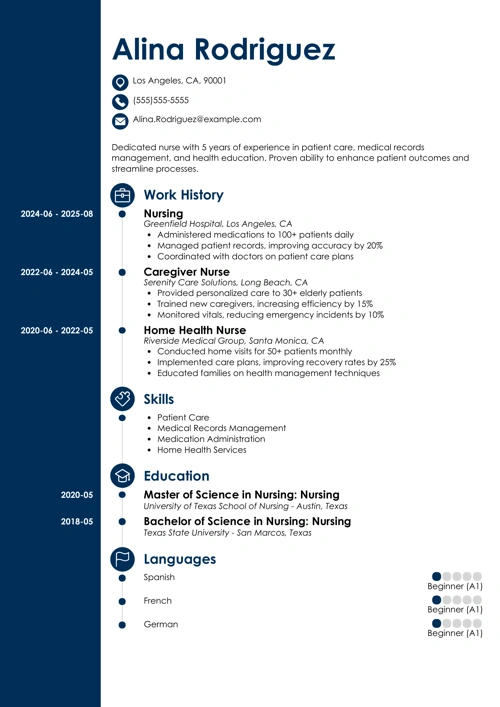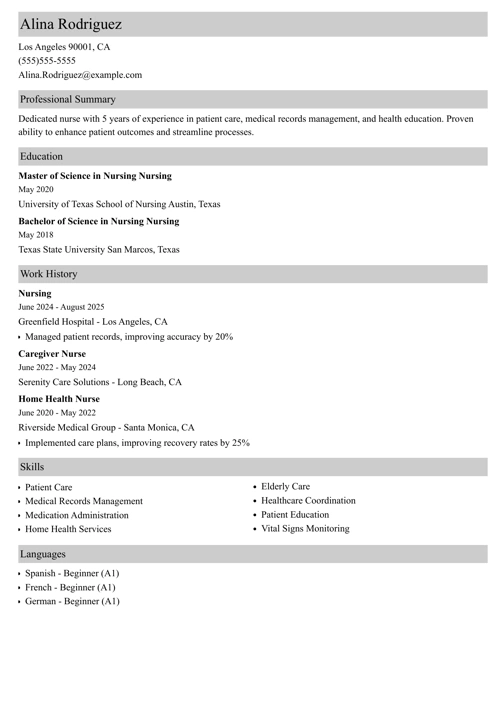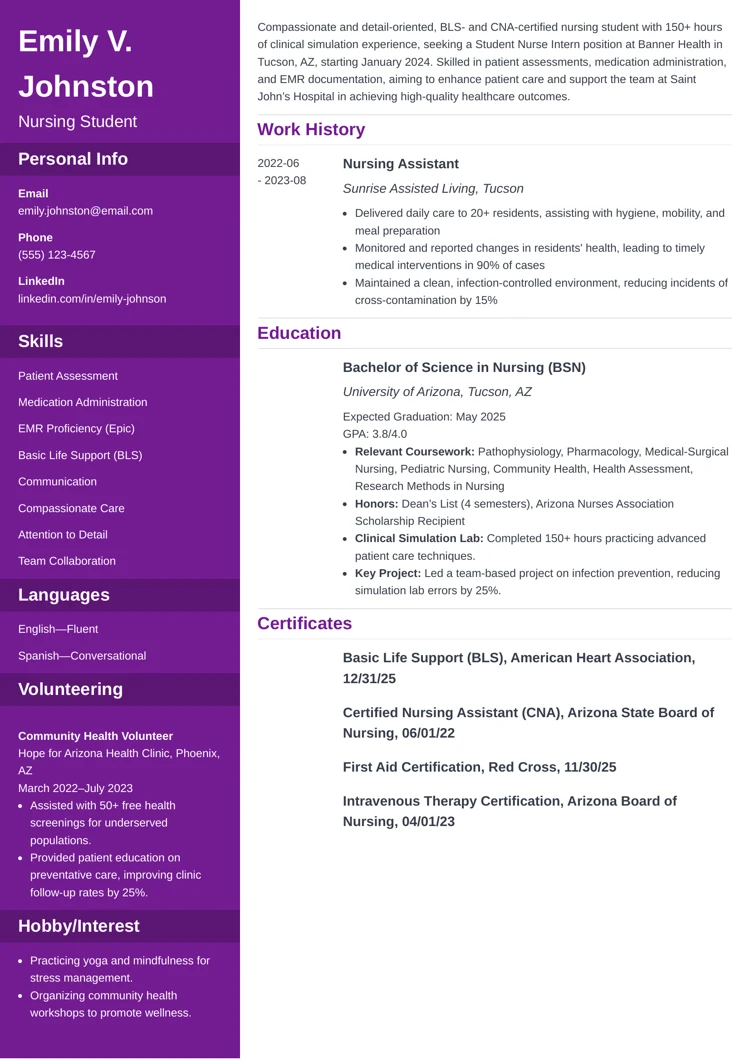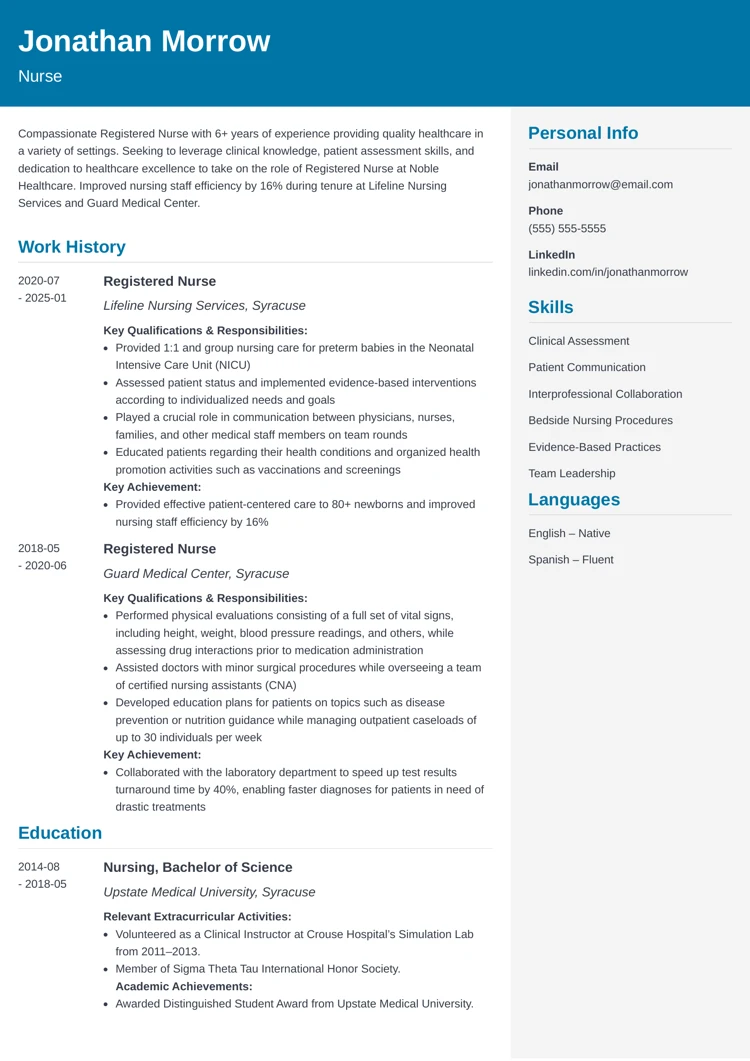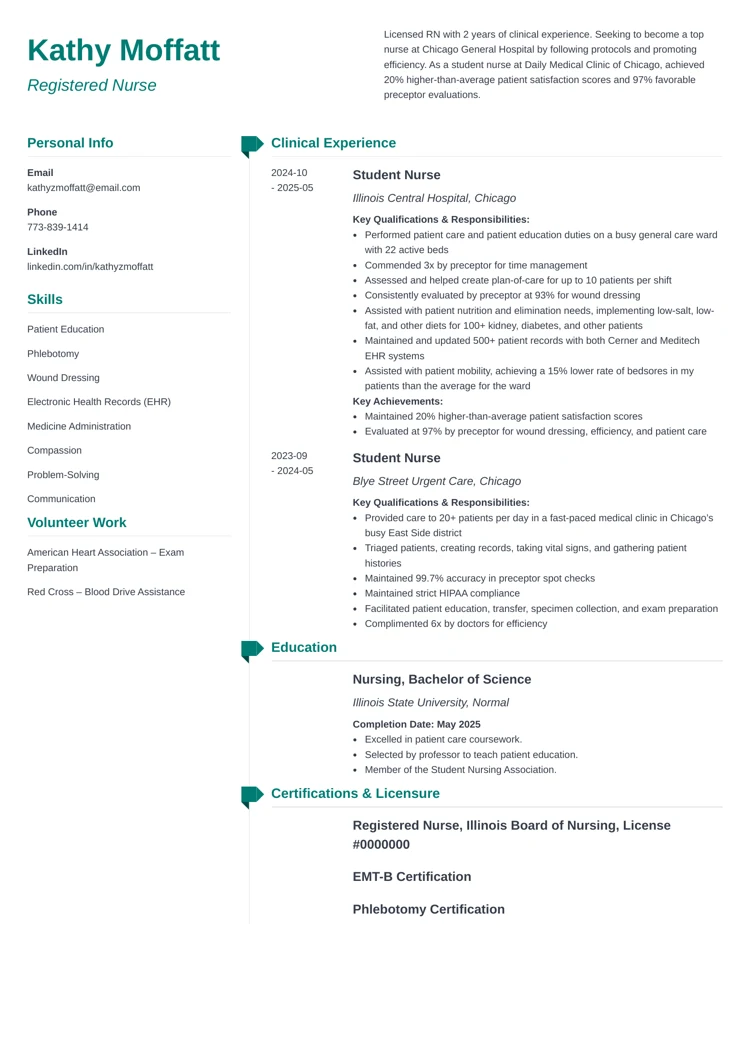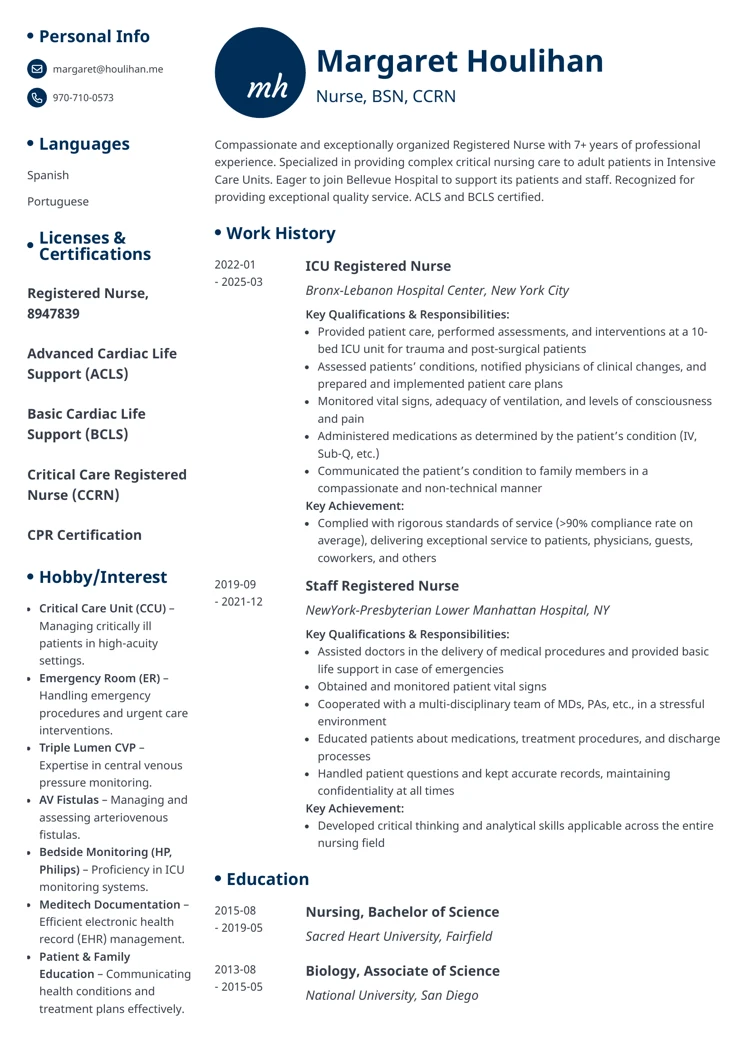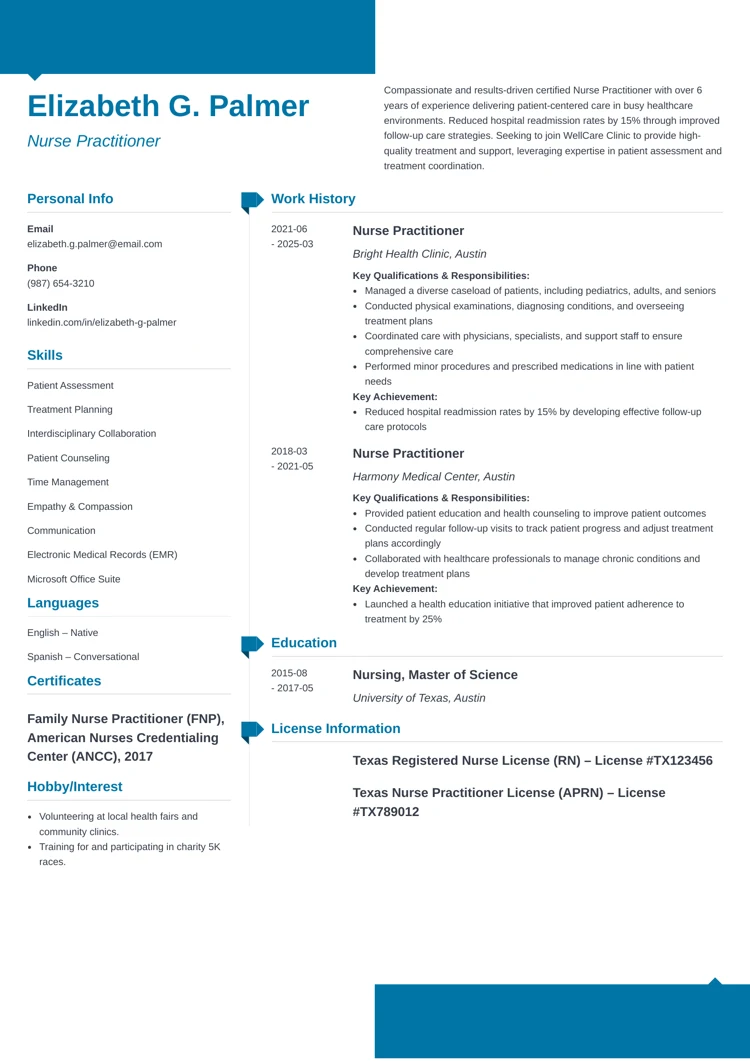You have the clinical expertise, the certifications, and the compassion to be an exceptional nurse. But to land the job, you need a great nurse resume that catches the hiring manager’s eye and highlights your skills.
Not sure where to start? I’ll show you nursing resume examples, templates, and tips that will help you create a polished, professional nursing resume with ease!
Top Article Insights:
- A nurse resume example & template to copy & paste
- More resume examples for new nurses, registered nurses, ICU nurses, and more
- Step-by-step guide on how to write a nursing resume
Nurse Resume Example
Nurse Resume Template to Copy & Paste (Text Version)
Alina Rodriguez
Registered Nurse
123-456-7890
alina.rodriguez@email.com
linkedin.com/in/alina.rodriguez
Summary
Compassionate and dedicated Registered Nurse with over 5 years of experience providing quality patient care in fast-paced hospital settings. Eager to support Care Craft Center in delivering top-tier medical care by leveraging skills in patient assessment, care plan development, and health education. Reduced medication administration errors by 25% through initiating and developing a robust medication protocol at Heal Hospital.
Experience
Registered Nurse
Heal Hospital (ICU), Pittsburgh, PA
January 2022–Present
Key Qualifications & Responsibilities
- Conducting comprehensive patient assessments.
- Developing tailored care plans for a monthly average of 20 patients.
- Administering medications and treatments, maintaining a 98% accuracy rate.
- Educating patients and family members on disease prevention and post-hospital treatment.
Key Achievement:
- Reduced medication administration errors by 25% by initiating and developing a robust medication protocol.
Licensed Practical Nurse
VitalCare Health Clinic, Pittsburgh, PA
June 2020–December 2022
Key Qualifications & Responsibilities
- Provided nursing care under the supervision of a registered nurse.
- Assisted in the implementation of individualized patient care plans.
- Performed basic nursing procedures such as wound dressings and vital signs monitoring.
Key Achievement:
- Acknowledged for excellent patient care in the 2016 employee performance review.
Education
Bachelor of Science in Nursing
University of Pittsburgh, Pittsburgh, PA
August 2016–May 2020
Relevant extracurricular activities
- Member of the Student Nurses Association
- Volunteered at local health fairs to provide basic screenings and health education.
Skills
- Patient Assessment and Care Plan Development
- Patient Education
- Medication Administration
- Emergency Room Experience
- Excellent communication and interpersonal skills
- Strong problem-solving abilities
- Superior organizational skills
- Attention to detail
Certifications
- Certified Pediatric Nurse (CPN), Pediatric Nursing Certification Board, 2021
Languages
- English—Native
- Spanish—Intermediate
Interests
- Running half-marathons for charity.
- Volunteering at a local animal shelter.
Nursing Student Resume Example
What Do I Think About This Example? (Expert Tips)
I really like how this template keeps things clean, professional, and easy to read—perfect for a nursing student. The left-hand sidebar neatly organizes certifications and skills, while the main section effectively highlights clinical experience and education. The subtle color accents add a polished touch without distraction. If I were applying for a student nurse position, this format would make my qualifications attract a recruiter’s attention.
Find out more about: Nursing Student Resume Example
Registered Nurse Resume Example
What Do I Think About This Example? (Expert Tips)
I really like how this nursing resume template combines professionalism with a structured layout, making it a great choice for registered nurses. The bold section headings ensure key qualifications stand out, while the two-column design keeps everything well-organized, allowing skills, certifications, and experience to be easily scanned.
The main content area does a great job of emphasizing clinical experience and key achievements, making it perfect for highlighting patient care expertise. If I wanted to showcase my nursing background in a clear, polished, and easy-to-read format, this template would be a solid choice.
Find out more about: Registered Nurse (RN) Resume Example
New Grad Nurse Resume Example
What Do I Think About This Example? (Expert Tips)
The template of this sample nurse resume keeps everything clean and professional—great for a nurse. The left-hand sidebar neatly highlights certifications and skills, while the main section focuses on clinical experience. The readable layout and subtle color accents make it easy to scan, ensuring key qualifications stand out at a glance. If I were a nurse looking to emphasize my patient care experience and qualifications, I’d feel confident using this template.
Find out more about: New Grad Nurse Resume Example
ICU Nurse Resume Sample
What Do I Think About This Example? (Expert Tips)
This resume template does a great job of creating a strong and professional first impression—ideal for a registered nurse in a high-pressure healthcare setting. The bold name header with initials adds a polished touch, while the clean, structured layout ensures that ICU experience, certifications, and key skills are easy to find. I appreciate how the well-defined sections make it effortless to highlight clinical expertise and patient care achievements.
Find out more about: ICU Nurse Resume Example
Nurse Practitioner Resume Example
What Do I Think About This Example? (Expert Tips)
This template offers a modern, professional layout—great for a nurse practitioner. The bold name header makes a strong first impression, while the well-structured sections keep experience and certifications easy to find. I like how the clear design highlights patient care expertise, making this a polished and effective choice for healthcare professionals.
Find out more about: Nurse Practitioner Resume Example
Looking for a different nursing position? Take a look at this selection:
- ER Nurse Resume
- NICU Nurse Resume
- Labor and Delivery Nurse Resume
- Medical Surgical Nurse Resume
- Operating Room Nurse Resume
- Travel Nurse Resume
- Pediatric Nurse Resume
- Charge Nurse Resume
- School Nurse Resume
- Telemetry Nurse Resume
Creating a resume with our builder is incredibly simple. Follow our step-by-step guide and use content from Certified Professional Resume Writers to have a resume ready in minutes.
When you’re done, Zety’s resume builder will score your resume and our resume checker will tell you exactly how to make it better.
How to Write a Nurse Resume?
Let’s move to expert tips for creating a job-winning nurse resume, complete with examples. But first, let's review some key nurse resume statistics from the Zety builder:
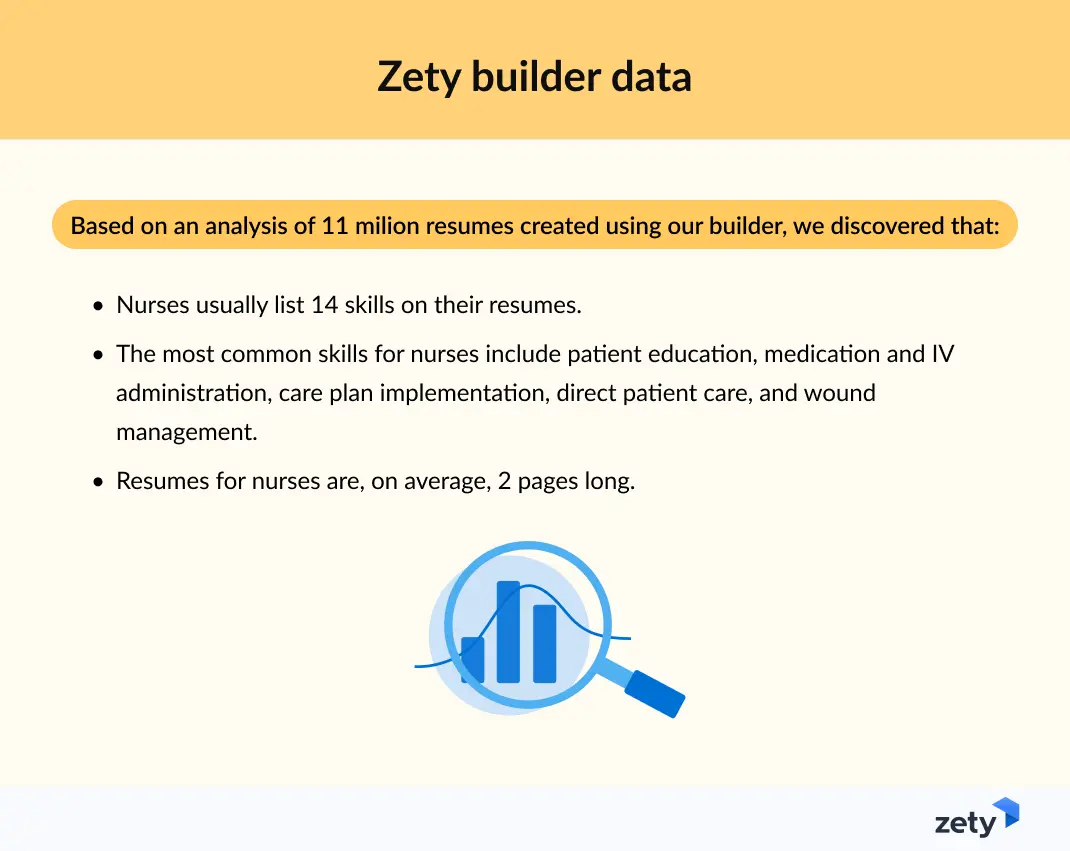
1. Format Your Nursing Resume Template Properly
According to our HR statistics report, recruiters spend just 7.4 seconds initially scanning a resume. To effectively grab the hiring manager’s attention, you need to format your nurse resume properly so that it’s legible and makes it easy to find all the information that the recruiter is looking for.
Here's how to format your nursing resume the right way:
- Don’t forget to include your current contact information in your resume header. Include your license type and number in your resume header, too, so that the recruiter can see it at first glance.
- Choose a traditional format like the chronological resume format.
- Go with a resume layout that makes good use of white space and easy-to-read subheadings.
- Set your resume margins to 1" and double-space between resume sections.
- Choose a classic, legible resume font.
- Save your resume as a PDF to preserve the layout.
- Use your complete name and job title to name your resume file.
Pro Tip: A concise, well-structured resume increases your chances of getting noticed by recruiters. A one-page resume is ideal for those with fewer than 10 years of experience, while a two-page format is acceptable for seasoned professionals.
2. Add Experience to Your Nurse’s Resume
Employers need to see how your work has positively impacted patient care. Instead of listing tasks, emphasize your contributions and measurable outcomes.
How to structure work experience:
- Begin with your most recent position.
- Include the facility type, unit type, location, and employment period.
- Provide a clear job description.
- Use bullet points to highlight key achievements.
Registered Nurse (Emergency Department)
St. Luke’s Medical Center, Chicago, IL
July 2018–May 2020
Responsibilities:
- Delivered urgent medical care to critically ill and injured patients.
- Assisted in emergency surgical procedures and trauma response.
- Maintained precise patient documentation and medical records.
Notable Achievements:
- Developed a triage system that cut ER wait times by 20%.
- Mentored 10+ new nurses on emergency care protocols.
Pro Tip: Use metrics to make achievements more impactful. Instead of “Improved patient care,” say “Reduced patient recovery times by 15% through optimized treatment plans.”
3. Make Your Education Section Shine
If you have some experience, you can place your education section after the work experience part of your nursing resume. But—if you’re writing an entry-level resume for nursing, then your educational background will probably be the most important part of your resume and should be placed higher.
Here’s what to include in the education section of a resume for nursing:
- Name of your school or university
- Dates of attendance (use "in progress" for the end date if you’re still studying, and include your anticipated graduation date)
- Degree obtained (e.g., Bachelor of Science in Nursing, Master of Science in Nursing)
- Location of the institution
- GPA (if it’s 3.5 or higher)
Obviously, when you don’t have much professional experience, you can expand on your education section using bullet points to present details that will prove to the recruiter that you’re a great match for the job.
Below, you can check out a sample education section for a resume for a nurse who already has some experience:
Bachelor of Science in Nursing (BSN)
University of California, Los Angeles (UCLA)
Graduated: 2017
Certifications & Licenses:
- Registered Nurse (RN) License – California Board of Registered Nursing
- Basic Life Support (BLS) Certification – American Heart Association
- Advanced Cardiac Life Support (ACLS) Certification – American Heart Association
Pro Tip: If you hold multiple certifications, consider grouping them under one section titled “Certifications & Licenses” to keep your resume clean and organized. Recruiters should be able to scan your credentials quickly without unnecessary clutter.
4. Pick Relevant Nursing Skills for Your Resume
What to put on a nursing resume when it comes to skills? Most of the skills you list should come from the job description. These are your resume keywords. They’re also the skills that recruiters try to find while scanning your resume. Such a strategy will let you stand out from other candidates. Especially given the fact that the U.S. currently suffers a large skills gap in the healthcare sector.
But—how do you know which skills are the most important?
Sometimes the job description will tell you that a skill is desirable or mandatory. If not, you can try checking out other job descriptions like yours. You can also check out the LinkedIn profiles of other nursing professionals. Look for repeated skills. You can assume that these are important skills for a nursing resume.
It’s crucial to make sure your professional nursing resume balances and includes both hard skills, soft skills, and technical skills. Why? Because nursing is a field with a ton of subspecialties. Listing specific responsibilities allows recruiters to know that you have the right set of hard skills vs soft skills. So for a CNA job, you need to include CNA duties on your resume.
We can divide skills for a nursing resume into four categories:
- Basic care
- Job-related technical skills or specialties
- Administrative skills
- Computer skills
Try to build the nursing resume skills section by highlighting your abilities from each category above. But—don’t mistake computer skills for technical skills. With the continued transition to the newest generation of electronic health records (EHR) systems across the U.S., software proficiency is no longer just a bonus—it’s essential.
Many hospitals and clinics now rely heavily on EHR platforms like Epic, Cerner, and Meditech, which means having strong computer skills can give you an edge in the job market. Even if the job description doesn't specify a particular software, it’s a good idea to include your familiarity with EHR systems or general computer skills.
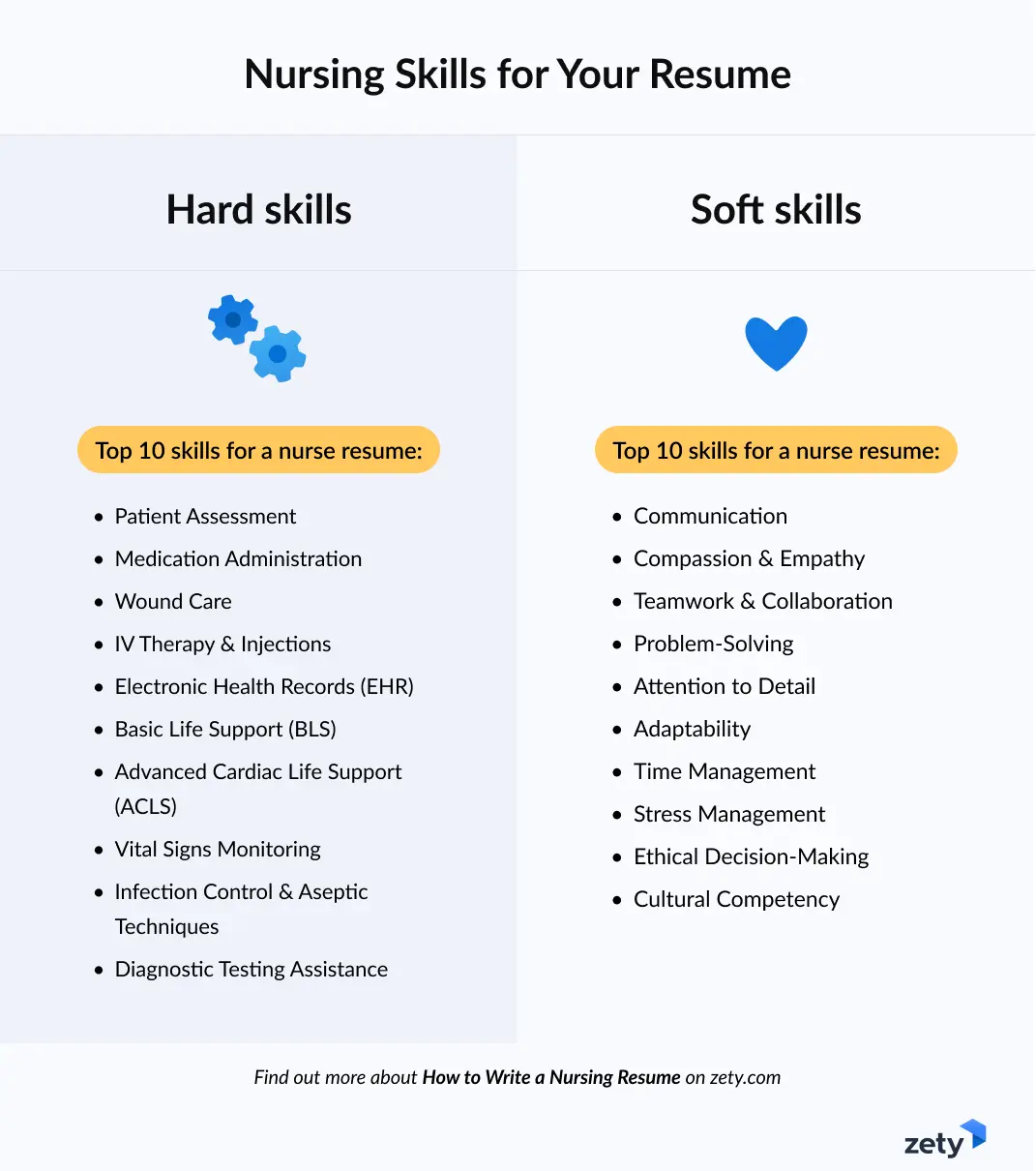
Pro Tip: Review job postings for common keywords and incorporate them into your resume where applicable. This improves your chances of passing the ATS screening and landing an interview.
5. Add Extra Sections to Strengthen Your Nurse's Resume
A strong nursing resume goes beyond the basics of work experience and education. By strategically adding extra sections, you can highlight key credentials, professional development, and personal strengths that set you apart from other candidates. Below are the key additional sections you should consider including in your nursing resume:.
Certifications and Licenses
There are many nursing certifications, and it’s impossible to list them all. However, there are plenty of resources that list them, such as Lippincott’s Nursing Center’s list, which includes the organizations’ phone numbers and email addresses.
Nursing certifications and licenses prove your qualifications and legal ability to practice. While your primary licensure (e.g., RN, LPN, NP) may be included in your education section, you can create a separate section titled Certifications and Licenses if you hold multiple credentials.
How to list certifications and licenses:
- License Type: RN, LPN, NP, CRNA, etc.
- Issuing Body: State or national licensing board
- License Number (optional, but recommended for recruiters to verify easily)
- Status: Active, Expired, or Pending Renewal
- Expiration Date (or "Active Since" date for perpetual licenses)
State Designations
If you hold advanced state-specific designations, such as Advanced Practice Registered Nurse (APRN) or Clinical Nurse Specialist (CNS), include them in your resume to showcase your authority to practice at an advanced level. List these credentials with their respective issuing board and the year obtained.
Awards and Honors
Awards demonstrate your excellence in nursing and commitment to the profession. Include recognition from nursing schools, healthcare institutions, or professional organizations in a separate Awards and Honors section.
Professional Associations
Membership in professional organizations reflects your dedication to staying current in the field. If you've held leadership roles within these organizations, be sure to highlight them.
Languages
If you speak multiple languages, especially those commonly spoken in healthcare settings, create a Languages section to highlight your linguistic abilities.
Volunteer Experience
Volunteering can showcase your commitment to patient care and your community. If you have experience working with underserved populations, humanitarian missions, or nursing-related volunteer work, include a Volunteer Experience section.
Hobbies and Interests (Optional for Entry-Level Nurses)
Adding a Hobbies and Interests section can add personality to your resume, particularly if you're a new graduate with limited experience. Choose activities that reflect skills relevant to nursing, such as teamwork, leadership, or stress management.
Pro Tip: License numbers are in the public domain. Recruiters can look up your number online via the State’s Board of Nursing website. Putting the number on your nursing resume saves recruiters time and energy.
6. Write a Strong Nursing Resume Objective or Summary
A compelling resume profile acts as a snapshot of your nursing qualifications, summarizing your key skills and career highlights in a few sentences. It can come in two forms: as a career objective or as a resume summary. A well-written resume profile can immediately capture the attention of hiring managers.
How to write an engaging resume profile:
- Start with an adjective (e.g., dedicated, compassionate).
- Mention your job title (e.g., Registered Nurse, Nurse Practitioner).
- State your years of experience.
- Highlight a key achievement or specialty.
- End with how you can benefit the employer.
Example resume profile:
Dedicated Pediatric RN with 15+ years of experience in intensive and neonatal care units at a community hospital. Proven ability to manage patient treatment plans and collaborate with interdisciplinary teams. Seeking to bring expertise in pediatric patient care to General Hospital.
Your resume profile should serve as a compelling elevator pitch to potential employers, capturing their attention within the first few seconds. Focus on highlighting your most impressive achievements and key skills that are relevant to the job you're applying for, demonstrating immediately why you are the ideal candidate for the position.
Pro Tip: A resume profile is also a great place to include your availability. Since nursing is a 24/7 profession, indicating your preferred shifts can help hiring managers match you to the right role.
7. Write a Job-Winning Nurse Cover Letter
A well-written cover letter can set you apart by showcasing your passion for patient care and emphasizing key nursing qualifications that may not be fully highlighted in your resume. While some believe cover letters are optional, they provide an excellent opportunity to personalize your application and demonstrate your commitment to the role.
How to structure your nursing cover letter:
- Address the hiring manager by name (e.g., "Dear Nurse Manager Smith").
- Start with a compelling introduction that highlights your enthusiasm for nursing.
- Emphasize key nursing skills and achievements relevant to the role.
- Showcase your commitment to patient care, teamwork, and continuous learning.
- End with a strong closing statement, expressing interest in an interview.
Example opening statement:
Dear Dr. Roberts,
Caring for patients is not just a job—it’s my calling. As a dedicated Registered Nurse with five years of experience in high-acuity settings, I have a proven ability to deliver compassionate care while optimizing patient outcomes. I am excited about the opportunity to bring my expertise in critical care nursing to City Hospital.
Pro Tip: Tailor each cover letter to the specific job and hospital. Mentioning the facility’s values, specialties, or patient demographics can help demonstrate why you are the right fit.
Plus, a great cover letter that matches your resume will give you an advantage over other candidates. You can write it in our cover letter builder here. Here's what it may look like:
See more cover letter templates and start writing.
Expert Curated Video Content
If you prefer watching, our Certified Professional Resume Writer Caio will explain, will explain to you in detail how to write a nurse's resume in 5 minutes!
About Zety’s Editorial Process
This article has been reviewed by our editorial team to make sure it follows Zety's editorial guidelines. We’re committed to sharing our expertise and giving you trustworthy career advice tailored to your needs. High-quality content is what brings over 40 million readers to our site every year. But we don't stop there. Our team conducts original research to understand the job market better, and we pride ourselves on being quoted by top universities and prime media outlets from around the world.
Sources
- National Council of State Boards of Nursing, "License verification"
- Deloitte, "Preparing for the next generation of electronic health records"
- Definitive Healthcare, "Most common hospital EHR systems by market share"
- Western Governors University, “15 Types of Healthcare Facilities in the Medical Field”
- Lippincott NursingCenter, "Nursing Certification Boards By Specialty"
- ClearCompany, "Addressing Skill Gaps in the Healthcare Industry"


